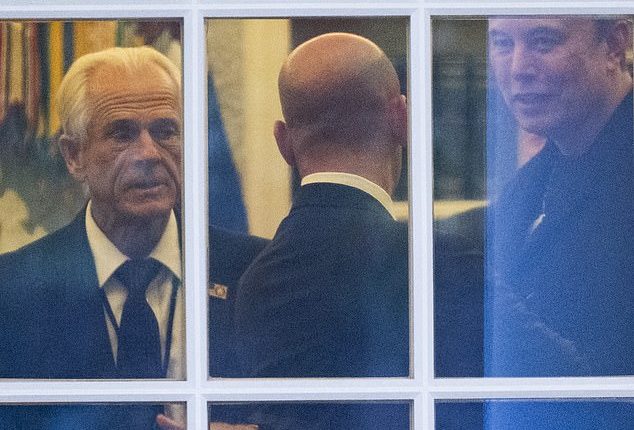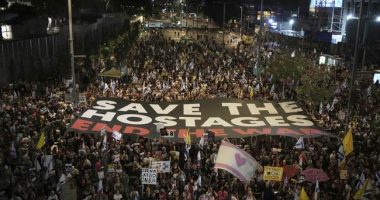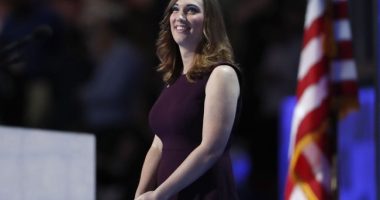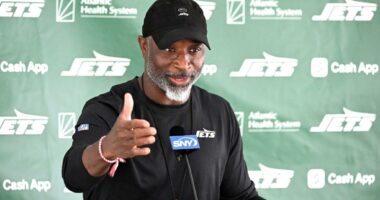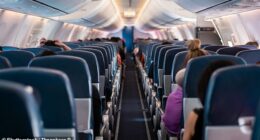Billionaire CEO of Tesla Elon Musk on Tuesday savaged President Donald Trump’s trade advisor Peter Navarro after he criticized the DOGE advisor’s car company.
Navarro described Musk as a ‘car assembler,’ as his Tesla vehicles made in the United States required parts manufactured in foreign countries such as China, Japan, and Taiwan.
‘When it comes to tariffs and trade, we all understand in the White House – and the American people understand – that Elon is a car manufacturer, but he’s not a car manufacturer. He’s a car assembler,’ Navarro said in an interview.
Musk responded angrily on X to Navarro’s claim.
‘Navarro is dumber than a sack of bricks,’ Musk replied on X. ‘Navarro is truly a moron. What he says here is demonstrably false.’
Musk shared a 2023 Cars.com study that showed Tesla as having four of the top 10 most American-made cars followed by the Honda Passport, the Volkswagen ID.4, and the Honda Odyssey.
The study shows that the ‘Big Three’ car companies like Ford, GM, and Stellantis lower on the list because of the parts imported from foreign countries.
The 2024 Cars.com ranking, however, is slightly less favorable to Tesla, even though Tesla’s Model Y is in the number one slot but the Honda Passport at number two, the Volkswagen ID.4 at number three, and the Tesla Model S in number four. The Honda Odyssey rounds out the top five.

Billionaire CEO of Tesla Elon Musk on Tuesday savaged President Donald Trump’s trade advisor Peter Navarro after he criticized the DOGE advisor’s car company. Pictured (from left) Peter Navarro, Stephen Miller and Elon Musk speaking inside the Oval Office of the White House on March 14, 2025

Musk personally lost billions in the market’s reaction to the tariffs, with the US stock market experiencing its worst trading week in five years. He is pictured with Donald Trump at the White House on March 14, 2025
The study, however, considers parts from both the United States and Canada as domestic manufacturing.
The author of the study American University associate professor of information technology and analytics Frank DuBois confirmed that Tesla does rely on Chinese parts for the manufacturing of their vehicles, even though they also build motors and batteries in the United States.
Musk waded into controversy on Friday after the markets closed and Navarro appeared on CNN to try and calm concerns over the damage caused by the tariffs.
The Tesla CEO – who is the world’s richest man – personally lost billions in the market’s reaction to the tariffs, which saw the US stock market experience its worst trading week in five years.
But after Navarro insisted that the tariffs would eventually pay off, Musk took to his X platform to mock the economic advisor.
Musk responded to a post that noted Navarro has a PhD in economics from Harvard, to which he said: ‘A PhD in Econ from Harvard is a bad thing, not a good thing. Results in the ego/brains>>1 problem.’
After a user responded to say that Navarro was ‘correct’, Musk remarked: ‘He ain’t built s***.’
But Navarro has since dismissed Musk’s concerns about Trump’s tariffs, noting it was understandable as coming from a ‘car person’.
‘He’s a car person. That’s what he does, and he wants the cheap foreign parts,’ he said. But Musk was not pleased with Navarro’s claim.
‘By any definition whatsoever, Tesla is the most vertically integrated auto manufacturer in America with the highest percentage of US content,’ he wrote on X.

Trump launched a historic trade war last Wednesday (pictured, announcing the tariffs) and China retaliated with 34 per cent reciprocal tariffs on US imports on Friday
Trump has hailed Tesla as an American-made car, even promoting it at the White House after the left started attacking Musk’s company and vandalizing Tesla dealerships and vehicles in the streets.
‘They’re harming a great American company,’ Trump said during the event at the White House where he praised Musk as a ‘patriot.’
‘He’s built this great company, and he shouldn’t be penalized because he’s a patriot,’ he said.
Musk’s brazen break with Trump’s inner circle comes just days after it was revealed that he would be stepping down from the Department of Government Efficiency (DOGE) – leaving the Trump White House early in a surprise move.
Musk also made direct yet unsuccessful appeals to Trump to reverse tariffs over the past weekend, Washington Post reports, citing two people familiar with the matter.
The exchange marked the highest profile disagreement between the President and Musk, the report said. It follows Trump’s unveiling of a 10 per cent baseline tariff on all imports to the US along with higher duties on dozens of other countries.
Musk called for zero tariffs between the US and Europe during a virtual interaction at a congress in Florence of Italy’s right-wing, co-ruling League Party over the weekend.
In the two sessions after the tariff decision was unveiled on April 2, the S&P 500 tumbled 10.5 per cent, erasing nearly $5trillion in market value, marking its most significant two-day loss since March 2020. Wall Street’s main indexes, however, clawed back some of the losses on Tuesday.
Tesla has seen its quarterly sales drop sharply amid a backlash against Musk’s work with a new Department of Government Efficiency.
The company’s shares are trading at $245.12 today after closing at around $233 on Monday, a 42 per cent decline since the beginning of the year. Musk has previously said that the impact of Trump’s auto tariffs on Tesla is ‘significant’.

Elon Musk (pictured during a White House cabinet meeting on March 24, 2025) made direct yet unsuccessful appeals to Donald Trump to reverse tariffs over the past weekend in what was the highest profile disagreement between the President and Tesla billionaire

Trade advisor to US President Donald Trump Peter Navarro speaks to press outside of the White House on March 12, 2025
Economists say the tariffs could reignite inflation, raise the risk of a recession and boost costs for the average US family by thousands of dollars – a potential liability for a president who campaigned on a promise to bring down the cost of living.
But America’s top trade official has today defended Trump’s sweeping tariffs on nearly every other nation, telling Congress that almost 50 countries had reached out to make a deal.
United States Trade Representative Jamieson Greer said exemptions to Trump’s global tariffs are not expected in the near term and argued that the strategy was ‘already bearing fruit.’
‘Nearly 50 countries have approached me personally to discuss the president’s new policy and explore how to achieve reciprocity,’ he told the Senate Finance Committee.
Several countries – including Argentina, Vietnam and Israel – had offered to reduce their tariffs, Greer said, while auto manufacturers were canceling layoffs and companies had announced $4trillion in new investment in the United States.
The annual hearings on the president’s trade policies are often staid affairs.

US President Donald Trump and Tesla CEO Elon Musk sit in a Tesla car model S on March 11

President Donald Trump steps out of a red Model S Tesla vehicle on the South Lawn of the White House on March 11, 2025
But they have generated more interest this year after Trump last week announced a baseline tariff of 10 percent and extra levies of up to 50 percent on dozens of countries exporting more to the United States than they buy.
Greer told senators the US had shed five million manufacturing jobs and 90,000 factories in the last 30 years, since a trilateral free trade agreement with Mexico and Canada was enacted.
America’s ‘large and persistent trade deficit’ will not be resolved overnight, he cautioned. ‘But all of this is in the right direction.’
‘We must move away from an economy based solely on the financial sector and government spending, and we must become an economy based on producing real goods and services,’ Greer added.
Senior Republican lawmakers have pledged to allow Trump time to see how his tariff gambit plays out, but are desperate to see progress on trade negotiations they believe will calm markets.
Wall Street stocks surged higher early Tuesday after a three-day rout as global markets rallied in hopes of trade agreements.
But rank-and-file lawmakers remain jittery about the effect of the tariffs and have been demanding briefings on the strategy, with some even seeking to remove Trump’s authority to raise import levies.

US Trade Representative Jamieson Greer takes his seat upon arrival at the start of a Senate Finance Committee hearing on President Donald Trump’s trade policies today

Donald Trump and White House Peter Navarro check out an Endurance all-electric pickup truck on the south lawn of the White House on September 28, 2020
Republican Senator Chuck Grassley is leading a bipartisan effort to require congressional approval of tariffs within 60 days, although it is not expected to get a floor vote.
Four Republican senators voted with Democrats last week to pass a symbolic resolution to undo Trump’s tariff on Canada that does not have the force of law.
Trump himself ruled out any pause in his aggressive new global trade policy on Monday, and threatened to slap an additional 50 percent tariff on China over its retaliation.
He also dismissed the possibility of a trade deal with the European Union and called his critics on trade ‘weak and stupid’ while pledging to veto Grassley’s bill, which is backed by at least seven Republicans.
